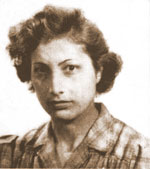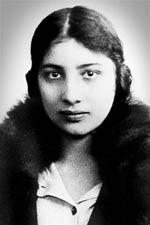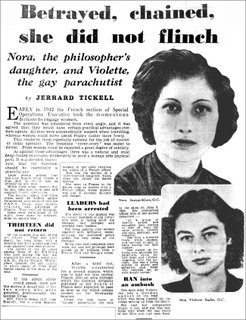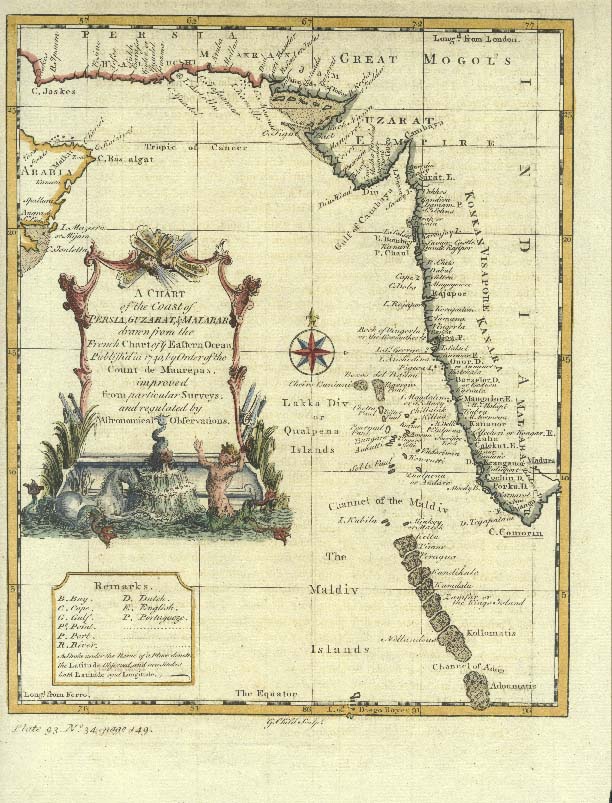"I wish some Indians would win high military distinction in this war. It would help to build a bridge between the English and the Indians."
 Whenever I passed the Baker Street tube station in London, it was the thought of Sherlock Holmes that sprang to my mind. Until I read about the WWII - SOE operations centre at Baker Street and the life of an extraordinary spy who uttered the words above.
Whenever I passed the Baker Street tube station in London, it was the thought of Sherlock Holmes that sprang to my mind. Until I read about the WWII - SOE operations centre at Baker Street and the life of an extraordinary spy who uttered the words above.The SOE, but for a couple of officers, believed otherwise.Driven by ideals of freedom and calling herself Nora Baker, she volunteered for SOE, which specialised in dropping agents behind enemy lines. Trained at the secret Baker Street headquarters, she proved a poor recruit, being too clumsy, too emotional and too scared of handling weapons… Her finishing report, which the official historian of F Section found in her personal file long after the war, read: She has an unstable and temperamental personality and it is very doubtful whether she is really suited to the work in the field."
Nobody knows if it was just idealism or if it was a broken engagement that drove Norah to volunteer. But she did, spending a rigorous year in training and was then dropped behind enemy lines in France, Code name Madeline, Cover name Jean Marie. France was known territory, a place she had grown up in, and here she worked in constant danger, moving constantly avoiding detection, as the only woman radio operator spying & reporting on the German movements.
At the critical moment before the D-Day landing in Normandy she remained the last radio operator on the Continent, ensuring the last link between the Allied Headquarters and the French Underground. The life and death of millions and the fate of generations after the war was to depend upon one spirited by the vocation of a hero who accepted the risk of the supreme sacrifice: torture.
Incredibly enough, the girl eluded the dreaded Gestapo for many months, cycling, with transmitter in tow, from one 'safe house' to another. It was even reported that she solicited the help of an enemy officer to string up her antenna - telling him, of course, that it was a clothes line!"'
She was instrumental in keeping a steady flow of information to the allies. But it was not to be, the Gestapo was catching up and eventually her friend’s wife betrayed her for a few francs. She was jailed, beaten, chained and interrogated. Stoic & brave by day, sobbing at night, probably fearing the betrayal and compromise of her intelligence operation (which it did), she resisted interrogation for many months though trying unsuccessfully to escape a couple of times. She was not destined to live, however, Hitler had decreed that escaping agents should be shot after interrogation.
She never talked, and her courage so impressed at least one of the Gestapo, Josef Kieffer, head of Gestapo HQ in Paris, that at his trial he is said to have broken down in tears when questioned about her death. "The Germans had learnt nothing from her - not even her real name."
On the fateful day, The SS undressed the girl and she was terribly beaten by Ruppert all over her body. She did not cry, neither said anything. When Ruppert got tired and the girl was a bloody mess he told her then he would shoot her. She had to kneel and the only word she said, before Ruppert shot her from behind through the head, was `liberté'." She was 30 years old. Dachau 1944.
A French military band still plays outside her home in the suburbs of Paris every July 14. The country she worshipped, India, hardly knows her.
 Noor unissa Inayat Khan – the great great great granddaughter of Tippu Sultan. Her father Hazrat Inayat, a man with a mission, to spread Sufism around the world, left India for America, met & married Ora-Ray Baker (Begum Sharada Ameena Baker). Tsar Nicholas II through Rasputin invited them to Russia and it was here that Noor was born in 1914. The Bolshevik revolution was brewing in Kremlin and it forced the family to move, destined for France where they settled and where Noor grew up, excelling in languages. Tragedy struck, Pir Inayat returned to India and died from illness. Noor was slowly settling down to
Noor unissa Inayat Khan – the great great great granddaughter of Tippu Sultan. Her father Hazrat Inayat, a man with a mission, to spread Sufism around the world, left India for America, met & married Ora-Ray Baker (Begum Sharada Ameena Baker). Tsar Nicholas II through Rasputin invited them to Russia and it was here that Noor was born in 1914. The Bolshevik revolution was brewing in Kremlin and it forced the family to move, destined for France where they settled and where Noor grew up, excelling in languages. Tragedy struck, Pir Inayat returned to India and died from illness. Noor was slowly settling down to  become a writer (her published works – 20 Jataka tales is still available on Amazon), but when the Germans reached France, the remaining family fled to Britain where Noor became Nora and decided to join the war cause, along with her brother. But she was clear that she would work for the Allies during WWII to defeat Fascism and that she would go back to India after the war to join the freedom struggle against the British!!
become a writer (her published works – 20 Jataka tales is still available on Amazon), but when the Germans reached France, the remaining family fled to Britain where Noor became Nora and decided to join the war cause, along with her brother. But she was clear that she would work for the Allies during WWII to defeat Fascism and that she would go back to India after the war to join the freedom struggle against the British!!At a memorial service in Paris, General de Gaulle’s niece summed up her achievement: “Nothing, neither her nationality, nor the traditions of her family, none of these obliged her to take her position in the war. However, she chose it. It is our fight that she chose, that she pursued with an admirable, an invincible courage.”
Noor’s comment about military distinction proved prophetic: at the "VE" and "VJ" days to mark the anniversary of the end of World War II, an astonishing fact came to light at the roll call, that it was Indians who outnumbered even the British as the largest recipients of Victoria and George Cross medals, the highest British awards for bravery.
SS Trooper Wilhelm Ruppert was tried for war crimes and executed by the Americans on May 29, 1946.
Update August 2007 - Shyam Benegal is planning on directing an upcoming movie on Noor Inayat Khan - The princess spy, based on Basu's book.
 Further reading
Further readingNoor Inayat Khan - WikipdeiaMadeline – Jean fuller
Spy Princess The Life of Noor Inayat Khan - Shrabani Basu
The Tiger claw – Shauna Singh BaldwinNoor Appreciation siteThe women who lived for danger – Marcus Binney




0 comments:
Post a Comment